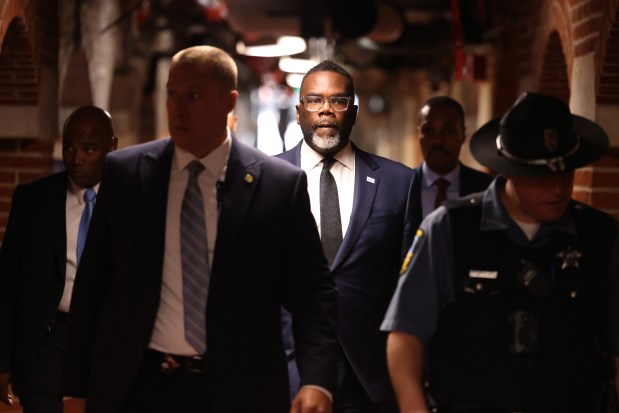It’s fair to say that Mayor Brandon Johnson has been his own worst enemy more than once during his 19 months in office. But his top aides aren’t helping his cause.
In recent weeks, we’ve seen three of Johnson’s most senior staff stumble in ways that bring discredit to his administration and fuel the narrative of an incompetent City Hall that has helped earn the mayor a 70% disapproval rating, according to recent polling.
First, Ronnie Reese, Johnson’s chief communications officer and a close colleague going back to Johnson’s days as a Chicago Teachers Union lobbyist, was fired in early November after staffers who were direct reports accused him of sexual harassment and bullying. There long had been red flags surrounding Reese, who denied the allegations even after his dismissal. In August 2023, the administration fired three holdovers from the Lightfoot administration who reported to Reese and had them placed on the city’s “do not hire” list, which they alleged was retaliation for complaining internally about their treatment by Reese and senior Johnson aide Jason Lee.
As Reese was fired, two of the three who still were on the do-not-hire list were told they could seek city employment again, but that was over a year after the fact. Reese now is on the city’s do-not-hire list himself, but that doesn’t make up for the damage done. One of the three, Azhley Rodriguez, said her treatment “completely ruined a future I would have, so it’s not fair to me.”
Making matters worse was chief of staff Cristina Pacione-Zayas’ handling of the internal complaints against Reese. A day after Pacione-Zayas was made aware of the nature of the allegations against him, she proposed gathering the complaining staffers with Reese and hashing out their differences via a “peace circle.” A peace circle is a method of conflict resolution that focuses on honest discussion rather than determining winners and losers as a means of working out differences.
The workers who’d complained objected to including Reese in the exercise “due to the shared fear of retaliation,” according to the 29-page complaint against him obtained by reporters under the Freedom of Information Act.
Pacione-Zayas in an interview with WBEZ defended herself by attempting to distinguish between the general workplace complaints against Reese (those were to be the subject of the peace-circle approach, she said) and the specific and clearly more serious sexual harassment allegations. “I did not and would not have ever offered (a peace circle) for a serious allegation like sexual harassment,” she said.
Her explanations aren’t satisfying. Upon learning that Reese had been accused of mistreatment of women because of their gender, she shouldn’t have suggested that sort of approach to address the turbulence in his office. Given that Reese had emerged as a flashpoint even a year earlier with the firing of the three staffers and their placement on the do-not-hire list, Pacione-Zayas’ initial actions when even more complaints surfaced raise legitimate questions of whether Reese was given favorable treatment due to his close ties to Johnson.
For his part, the mayor insists that he knew nothing about the specific allegations against Reese until the Chicago Tribune’s Oct. 25 filing of a FOIA request for Reese’s personnel file. Even that assertion came into question when news emerged soon thereafter that Johnson had texted CTU President Stacy Davis Gates, a close friend and adviser, on Oct. 19 with this cryptic message: “Ronnie! Call me. A message from the Elders.”
Johnson and Davis Gates shrugged off the text exchange and didn’t substantively address the matter.
The most recent misadventure at City Hall involves Lee, one of Johnson’s top political advisers, who was found to have voted in Houston in November even though he says he lives in Chicago, a requirement for city employment. Lee explained his apparent violation of voting laws by saying he’d promised his mother, U.S. Rep. Sheila Jackson Lee, before she died to vote for his sister to replace her in Congress.
“A lot of people are registered in their hometown even if they live somewhere else,” Lee told the Tribune. His “everyone does it” explanation ought to be unacceptable to his boss, but the mayor essentially shrugged. He said it was an issue for Texas authorities to investigate.
The common thread running through all of these problems is accountability — or the lack thereof. The initial approach to Reese’s inexcusable behavior appeared to be a “clear the air” talk with the people he was abusing rather than what ended up happening when they understandably balked: termination. Pacione-Zayas blamed hiring and firing processes instituted by prior administrations for her mishandling of the situation rather than taking any responsibility herself. Lee blithely dismissed an apparent violation of law.
A workplace culture of this sort isn’t an accident. Well into his term, Johnson himself still frequently blames his mayoral predecessors for the policy predicaments he struggles to solve. Negative outcomes seem always to be someone else’s fault with this group.
We’ve said this before, but the good news for this bad-news mayor is that he’s not even halfway through his term. He can take steps to improve his administration, but only if he first acknowledges the need. He then should change the culture to ensure that no one in his orbit is being treated more favorably than anyone else and that accountability will immediately follow from serious errors like abuse of city workers.
And it’s not too late for Johnson to look beyond his small circle of progressive allies for upgrades at key administration posts. We’re confident there are able, experienced Chicagoans willing to help the mayor right his managerial ship if he’s open to honest self-reflection.
Submit a letter, of no more than 400 words, to the editor here or email letters@chicagotribune.com.




